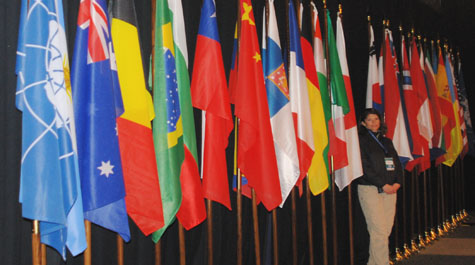VIMS student participates in Antarctic Treaty meeting
The meeting, the 32nd-annual gathering of signatories to the international treaty governing the southern continent, marked the 50th anniversary of the Treaty's signing and the conclusion of the International Polar Year. The Antarctic Treaty is a unique international agreement to reserve Antarctica for the pursuit of peace and science.
Geisz's role was to serve as a "rapporteur," generating the official record of proceedings during the 11-day event. The meeting was attended by nearly 400 diplomats, Antarctic program managers and logistics experts, and polar scientists from 47 countries, including 28 Consultative Parties with a scientific presence in the Antarctic.
Geisz's Ph.D. research at VIMS focuses on the accumulation of persistent organic pollutants in Antarctic seabirds. Her studies are part of the NSF-funded Long-Term Ecological Research program at the U.S. Palmer Station on the Antarctic Peninsula, where average annual winter temperatures have increased by 10° F during the last 50 years, five times the global average warming. Geisz is advised by VIMS Professor Rebecca Dickhut. VIMS professor Deborah Steinberg is one of the lead scientists for the Palmer LTER program; professor Walker Smith and several other VIMS researchers play a leading role in marine research near McMurdo Station in Antarctica's Ross Sea.
The Antarctic Treaty, signed in Washington D.C. in 1959, came into force in 1961 following the ratification of 12 countries active in Antarctic science. Today, 46 countries have signed the treaty, representing 80% of the world's population.
Designed to encourage international cooperation in Antarctica, the Treaty minimizes potential sovereignty disputes over territorial claims to the continent, stipulates that Antarctica is reserved exclusively for peaceful pursuit, and guarantees the freedom to conduct scientific research.
The delegates and a variety of interest groups discussed submitted proposals for amendment or clarification to the Treaty in four official meeting languages: English, Spanish, French, and Russian.
Highlights of the meeting included a 50th anniversary celebration at the National Academy of Sciences, where Secretary of State Hillary Clinton outlined the Obama Administration's interest in protecting the Antarctic. Secretary Clinton urged governments to use information gleaned from polar science to help advance progress at the Copenhagen 2009 climate talks. "We have no time to lose in tackling this crisis," she noted.
Geisz says "It was exciting to see how much proactive attention climate change research and information received at the meeting." Treaty delegates agreed that continued long-term monitoring is imperative continent-wide, and began discussions on establishing a marine protected area in the Ross Sea dedicated to climate-change research. Focusing on the mechanisms of climate change, Belgium introduced the first zero-emissions Antarctic base, their Princess Elisabeth Station.
Following recent explosive increases in the popularity of travel to polar regions, much of the meeting focused on the management of Antarctic tourism. A report released by the Republic of Liberia detailed the events that led to the sinking of a tourist vessel, The Explorer, in 2007. Though no lives were lost in the accident, the report sparked conversations calling for an increase in safe and environmentally responsible visitation to Antarctica.
Other increases in environmental protections are detailed in the meeting's final report as drafted by the Secretariat team, including Geisz. She notes the strength of the Antarctic Treaty is the commitment of the Treaty members to protection of this unique frozen continent.
Meeting declarations are available at: http://www.state.gov/g/oes/rls/other/2009/121340.htm and http://www.state.gov/g/oes/rls/other/2009/121339.htm.
















